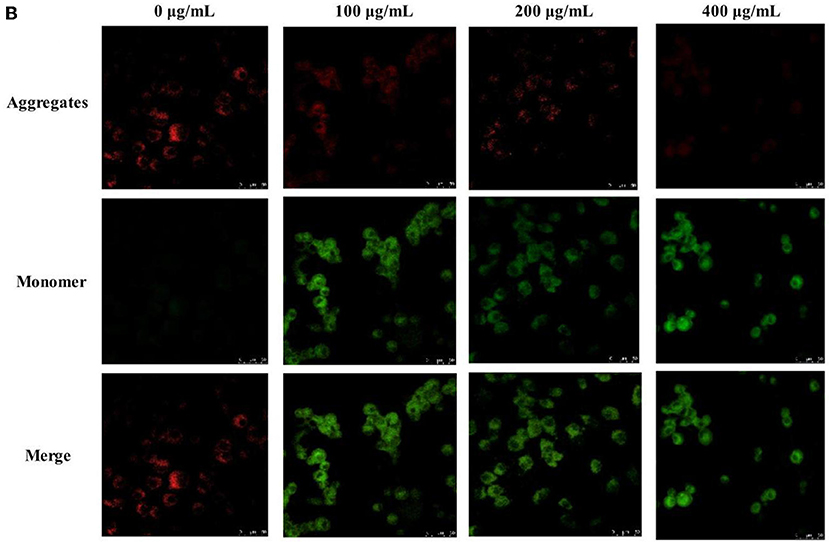Anti-cancer Potential of Polysaccharide Extracted From Polygonatum sibiricum on HepG2 Cells via Cell Cycle Arrest and Apoptosis
- 1College of Food Science, Shenyang Agricultural University, Liaoning Engineering Research Center of Food Fermentation Technology, Shenyang Key Laboratory of Microbial Fermentation Technology Innovation, Shenyang, China
- 2College of Criminal Science and Technology, Criminal Investigation Police University of China, Shenyang, China
- 3Heilongjiang Academy of Traditional Chinese Medicine, Harbin, China
- 4Institute of Crop Germplasm Resources, Shandong Academy of Agricultural Sciences, Jinan, China
A corrigendum on
Anti-cancer potential of polysaccharide extracted from Polygonatum sibiricum on HepG2 cells via cell cycle arrest and apoptosis
by Li, M., Liu, Y., Zhang, H., Liu, Y., Wang, W., You, S., Hu, X., Song, M., Wu, R., and Wu, J. (2022). Front. Nutr. 9:938290. doi: 10.3389/fnut.2022.938290
In the published article, there was an error in Figure 5B. The effect of PSP-1 (200 μg/mL) on MMP in Figure 5B was wrongly used. The corrected Figure 5B and its caption appear below.

Figure 5. The morphological changes of HepG2 cells treated with 0, 100, 200, and 400 μg/mL of PSP-1 for 72 h (A), the morphological characterization of HepG2 cells was observed and photographed under a Confocal laser scanning microscope (A1), nuclear morphological changes induced by PSP-1 in HepG2 cells after DAPI staining. (A2) Effect of PSP-1 on MMP (B) Cell cycle progression was assessed using propidium iodide staining detected by fluorescence activated cell sorting. (C) The apoptotic rates of the indicated cells induced by PSP-1 at different concentrations for 72 h were detected by ANNexin V/PI double-staining asssy (D).
The authors apologize for this error and state that this does not change the scientific conclusions of the article in any way. The original article has been updated.
Publisher's note
All claims expressed in this article are solely those of the authors and do not necessarily represent those of their affiliated organizations, or those of the publisher, the editors and the reviewers. Any product that may be evaluated in this article, or claim that may be made by its manufacturer, is not guaranteed or endorsed by the publisher.
Keywords: Polygonatum sibiricum polysaccharide, structural characterization, antitumor activity, HepG2 cells, cell apoptosis
Citation: Li M, Liu Y, Zhang H, Liu Y, Wang W, You S, Hu X, Song M, Wu R and Wu J (2022) Corrigendum: Anti-cancer potential of polysaccharide extracted from Polygonatum sibiricum on HepG2 cells via cell cycle arrest and apoptosis. Front. Nutr. 9:1054565. doi: 10.3389/fnut.2022.1054565
Received: 27 September 2022; Accepted: 29 September 2022;
Published: 13 October 2022.
Approved by:
Frontiers Editorial Office, Frontiers Media SA, SwitzerlandCopyright © 2022 Li, Liu, Zhang, Liu, Wang, You, Hu, Song, Wu and Wu. This is an open-access article distributed under the terms of the Creative Commons Attribution License (CC BY). The use, distribution or reproduction in other forums is permitted, provided the original author(s) and the copyright owner(s) are credited and that the original publication in this journal is cited, in accordance with accepted academic practice. No use, distribution or reproduction is permitted which does not comply with these terms.
*Correspondence: Rina Wu, d3JuNjk1NkAxNjMuY29t; Junrui Wu, anVucnVpd3VAMTI2LmNvbQ==
†These authors have contributed equally to this work
 Mo Li
Mo Li Yumeng Liu1†
Yumeng Liu1† Rina Wu
Rina Wu